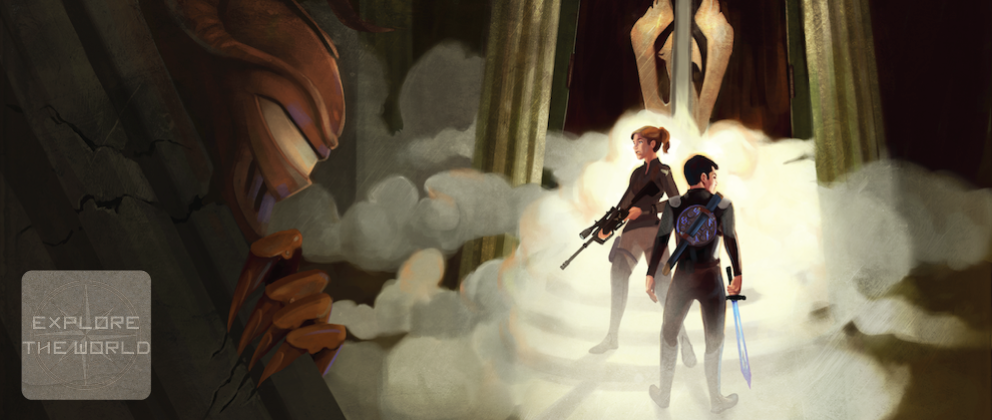Hi again, folks!
The past week has been pretty action packed, and the semester is only getting busier. We’re in the middle of midterms, and starting the really intense phase of the courses. I’m now learning Assembly (essentially, the language that we actually use to talk to computers, that the computer then translate into the binary language), and all of my courses have really stepped up their workloads.
Fortunately, I’ve still found time to have some fun now and then.
Last week saw the campus-wide game of Outbreak take over the school.
Outbreak is essentially glorified zombie tag, but it’s a big event here every October. So much so it’s not uncommon to see people planning their days and class events around it.
The game has two teams, ‘Humans’ and ‘Zombies’. Pretty much everyone starts as a human, and only a couple of ‘starter’ zombies are allowed. The goal of the zombies is to tag the humans, converting them into the growing horde. Humans are allowed to carry nerf guns and can shoot zombies to ‘kill’ them. This essentially removes the zombie from play for a set period until it revives. Every night at 8, the humans are given a mission they must complete, and the zombies try to stop them. The first nights usually go smoothly, but inevitably, people don’t pay attention and get picked off. By the end of the week, the horde has usually grown into triple digits, and the humans find the last mission extremely difficult to complete. So much so that the humans have never actually won a game, always failing to complete the final mission at the end of the week.
Which is good – it gave me more delicious brains to feast on. After one of my former teammates unwittingly pushed me into the zombie horde, my life became far simpler. It’s a good thing we’re hard to kill though, zombies tend to be rather unorganized. : )
The game goes pretty smoothly at DigiPen, and it was definitely a good experience.
Unfortunately, I actually didn’t get to participate in the final mission because I was in the middle of a ‘game jam’.
A ‘game jam’, as I discovered, is an assignment where students are surprised with the hypothetical scenario that: a) they just found out that the CEO of the company they work for is making a surprise visit, and b) the CEO will be there in 30 minutes, expecting to see a product. Student have to take a base idea given to them, and create a game in that time. Yeah, that’s right. My team and I had to build a game in 30 minutes.
We were told to build an Angry Birds clone, and every two minutes late we began to lose points off our score. We just barely managed to get our game in on time. We had art and pulled in some music for our breakout hit “Cannon vs Super Frowny’. And a better game name than team ‘Not Angry Birds’ (and quite a few others). Unfortunately, while our cannon had controls, it didn’t actually fire. And it had a weird problem where it would begin to spin endlessly faster and faster… but that’s not the point.
The point is that we actually did pretty well, considering. It was obviously an extreme example, and a hilarious exercise, as all the games were extremely flawed. We got to see everyone’s final product, which was quite entertaining.
But besides that, it was a good chance to work on team-building, and to understand what components are critical to get together for deadlines, even if they are unexpected.
That was last Friday. Last Saturday, I finally managed to get over to Seattle to see a friend I met at PAX for a board game and ‘Minnesota State Fair’ fried foods party. I had the chance to meet some great new people while stuffing my face with homemade corn dogs, cheese curds, and bloomin’ onions. It was pretty fantastic.
And we had a good mix of board games for all types of players, from the more casual to big strategy fans, so a great time was had by all. I discovered an amusing party game called ‘Wits and Wagers’, which I recommend to anyone and is super easy to play. It involves trivia questions where everyone writes down their answer and then places the question on a board that gives each answer different odds depending on how far out it is. For example, if the question was “How many fish live in the sea?” and the answers ranged from say, 10 to 100 trillion, the person who said 1 trillion might get the worst odds at 3:1 because they were in the middle of the pack. After that process is done, everyone votes with their chips what the best answer is, and the people who get closest collect their winnings. It’s a great game for a crowd because you don’t actually need to be great at trivia to do well at the game, but it certainly helps!
Now, I’ve got some serious school-projects and studying to do for next week, so I’ll wrap this post up.
See you next time!










I know the guy who created the game wits and wagers!